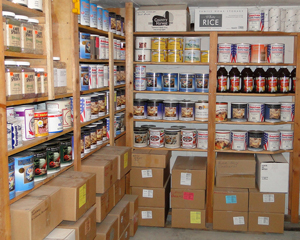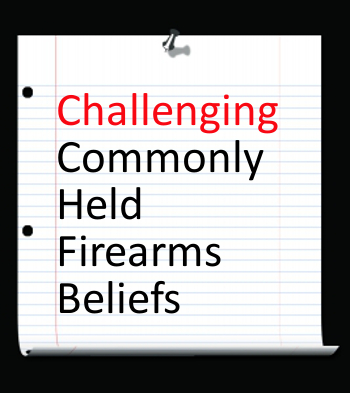In terms of cost and scope, food storage is probably the biggest branch of preparedness. The larger your family and the more food you want to store, the costlier and more complex planning how to build your food storage can get. Having been at this a while, I thought I would give some advice that some of you might find useful. I’m also hoping some of you who have been at this a while as well, will chime in with your $.02.
Food storage might not be the most exciting topic but it is an important one. The stuff hit the fan for us when I lost my job a couple years back. Because of our food storage, we were able to get by on $50 some weeks at the grocery store.
How Much Food Should I Store?
Because of family size, budget, space and other concerns, this is completely subjective. Please forgive this lame answer but; as much as you can! I used to set goals; 90 days, 6 months, a year and so on, but have changed my thinking since then. I still think those goals are great and, if possible, we should strive for them, but why stop when you reach one goal?
If you’re following the “golden rule of food storage”; eat what you store, store what you eat, the majority of food you store will be consumed on rotation, so it is not money wasted.
You will also have the added comfort of knowing you can provide for one of your family’s five basic human needs for an extended period of time. If you choose to share, it will give you that much more to assist those you choose to bless.
Expiration Dates
Most expiration dates you see on packaging is a marketing ploy. Pay heed if it is perishable food, but my research has shown that the dates listed for canned goods, most dry goods and bulk staples are, as I said, marketing ploy. I wrote two articles touching more on this. Feel free to read Expiration Dates; Fact or Fiction? and Shelf Life of Comfort Foods for more information.
Getting Started
Getting started with food storage can seem overwhelming, but if you keep the “golden rule of food storage” in mind, it becomes much more manageable a task. What I recommend is that you start a food log. Any time any shelf stable food is used in the kitchen, you enter it in the log. A shelf stable food is one that can last for months without refrigeration. After a couple weeks, you will have a good idea of the storable foods that your family eats on a regular basis.
I recommend setting a low, very achievable goal to start with. Go for two weeks of shelf stable food on top of what you’re consuming regularly. For example, if you eat green beans for meals twice a week, you would want four cans total; the two for normal use, and two for storage. You’ll lump them all together and rotate through them.
Once you have two weeks of food stored, aim for a month, then two and so on. A great tip for building food storage is called “copy canning”. When you take one can of green beans for a meal, buy two instead of one when you go to the store next. Remember to put it at the back of the row in the pantry!
Adding Bulk Staples
Once you’ve got two to three months of the foods you normally eat stored, you can really increase your food storage by adding bulk staples. Things like the various kinds of rice, beans, wheat and so on. Rice and beans are a prepper staple, but if the stuff hits the fan and your food storage is primarily rice and beans, well let’s just say I hope you stocked up on the Pepto and the BeanO! However, if you have three months of foods that you normally eat, and add in beans and rice or other meals made from bulk foods once or twice a week, you’ve now greatly extended that food.
One other thing you can do is see if there are long term substitutes for meals you regularly eat. For example, a favorite here is Trudee’s chicken stir fry. She used to buy fresh chicken breast, but once decided to try it with canned chicken and we actually liked it better. That is a meal we enjoy, and is primarily from our LTS (long term storage) foods.
I think continuing to add to your stockpile of foods you normally eat is a good idea, but adding in bulk staples can help you reach up to six months or more of food stored easily.
Long Term Food Storage
By this I mean freeze dried or commercially dehydrated food. These types of foods replace the oxygen in the food with nitrogen, thus giving the food a very long shelf life. Many manufacturers claim 20+ years.
Because this food isn’t consumed on a regular basis, it can seem quite expensive. However, it isn’t that much more than if you were to prepare the dish fresh.
I don’t recommend buying a #10 can of something you haven’t tried. Many manufacturers offer pouches that are 1-3 servings and are far cheaper.
Depending on the entrée, many #10 cans have 10 or so servings in them. Once opened, the can must be consumed relatively quickly. This isn’t something you would eat every day, but would add once or twice a week, again extending the “eat what you store” foods.
I know various manufacturers have sales throughout the year. Mountain House, for example, allows vendors to have a 25% off sale once a year. If you plan to buy cases, I would recommend saving up and taking advantage of a sale of this kind.
Storage Examples
Finding room to store everything can be a challenge. A very common way to store bulk foods is in Mylar, and then in food grade buckets. However, Mylar is food grade, so you can store it in other containers. I have some in buckets, but I wrote a post about storing food in 31 Gallon Garbage Cans. I can fit roughly the same amount of food in them, but they are a heck of a lot easier to find and are far more rodent resistant.
If you have any other tips or ideas please post a comment.
Please click here to vote for Prepared Christian as a top Prepper site!
If you liked this article please think about sharing it on the social media listed below, thanks!





